BOONE, N.C. — Appalachian State University students in the Hayes School of Music are gaining hands-on experience with state-of-the-art technology that will help prepare them for a future in the ever-advancing music industry.
This past summer, for example, music industry studies students helped faculty install a new Dolby Atmos immersive sound system in the Robert F. Gilley (RFG) Recording Studio.
Scott Wynne, professor and chief recording engineer in the Hayes School of Music — who led the installation — said the experience offered students an opportunity to learn about a technology that is becoming a prominent force in a variety of professions.
“Dolby Atmos is being used in professional movie theaters, for live and studio music productions, broadcasting, video games and a lot more,” said Wynne. “It’s modern technology like this that makes us one of the most excellent programs in the region.”
Vivian Rogers, a senior music industry studies major from Rocky Mount, was one of many students to help install the Dolby Atmos studio over the summer.
“We soldered cables, put up speakers and the soundboard — a little bit of everything,” said Rogers. “It really helped me understand the foundation of installing a studio. I got to see the anatomy of what it takes to do this and everything involved in sound design, and I learned new construction skills and how to use different tools. It was really fun and I learned a lot.”
Rogers said working with state-of-the-art equipment has been “a combination of phenomenal and nerve racking,” but she’s grateful for the flexibility she has as a music industry studies student.
“We get to learn and figure things out a lot on our own, and that’s where the magic happens,” she said. “To get this hands-on kind of education is amazing.”
Now that the Dolby Atmos studio is installed, the App State Community gets to enjoy high fidelity capabilities that Wynne said will impress even the most discerning of audiophiles. Categorized as a 9.1.6, the system boasts nine surrounding speakers, six speakers in the ceiling and one subwoofer.
“In the height channels is where you really notice the difference,” said Wynne. “You’re essentially putting atmosphere up there — so a lot of reverbs, delays and reflections.”
Wynne said most people are familiar with the original 5.1 surround sound system, through which listeners hear the same sound out of each of the five surrounding speakers, but with the 9.1.6 setup, each additional speaker can be considered a new source point.
“If you’re watching a movie and something is being moved on the screen, it actually feels like it moves around you,” said Wynne. “For music productions, you can similarly move instruments or vocal parts from speaker to speaker, so you can hear a harmony come out of the ceiling, or you can hear a guitar part that’s moving around. It offers so much creativity.”
Wynne said plans for additional upgrades to the RFG Recording Studio are in the works and include redesigning the B Studio control room with an API Vision Console and a 64-channel digital desk that will essentially stretch along the entire width of the room, as well as gutting and completely rebuilding the B Studio with new acoustic designs, a 5.1 surround sound system, hanging speakers and televisions.
“The Hayes School of Music focuses on transforming students’ passion for music into their life’s profession,” said Dr. James Douthit, dean of the Hayes School of Music. “With the changes in how music is distributed, shared and consumed, it is important that a school of music stays as close to the cutting edge as possible on the variety of ways students can develop music careers.”
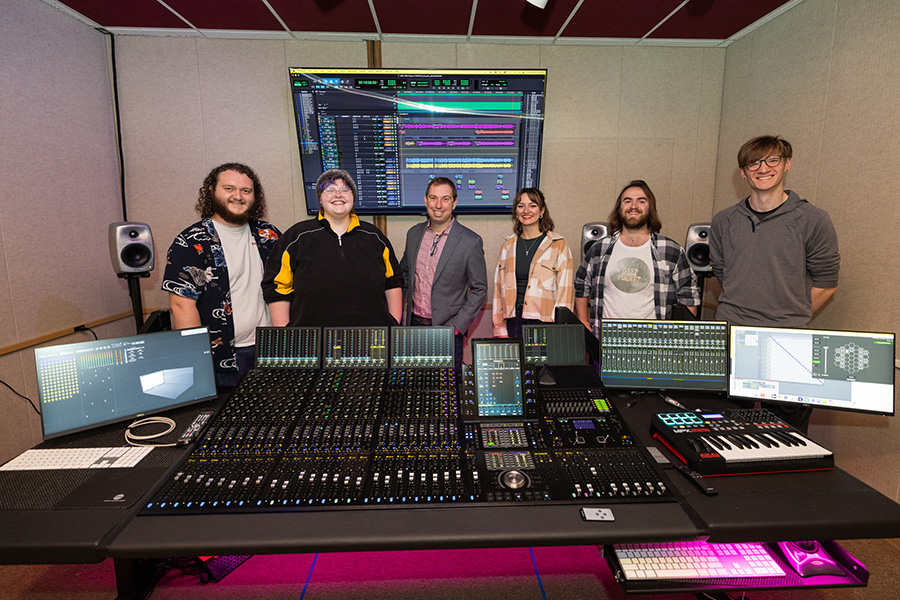
Scott Wynne, professor and chief recording engineer in App State’s Hayes School of Music, third from left, is pictured with the music industry studies students who helped him install the new Dolby Atmos studio in the Robert F. Gilley Recording Studio. The students, from left to right, are Arie Van Meter, Nathan Asher, Vivian Rogers, Jay Rogers and Declan Lynch. Photo by Chase Reynolds
App State grads make waves in music industry
Roughly 45 music industry studies students take audio classes each semester, and each student is required to complete a project every month — whether that’s recording a song for a band or recording a live performance as part of the Live at RFG Studio series in collaboration with App State’s student-operated TV channel, AppTV.
As a result of these types of projects, many bands have gone on to sign with App State’s student-run record label, Split Rail Records, which has gained national recognition by recording several acclaimed bands at the start of their careers, including Rainbow Kitten Surprise and River Whyless — formerly known as Do It To Julia.
Rogers was a past intern with Split Rail Records and has recorded and managed several bands during her college career. That opportunity opened the door for multiple other internships over the years, including with the Boonerang Music and Arts Festival and Carolina Ramble and Reunion in Boone, Earthtones Recording Studio in Greensboro and Resounding Strategies — a music industry services company based in Durham.
“In this industry you have to wear multiple hats,” said Rogers. “App State has provided me with so many great opportunities, and I’ve been so fortunate to be able to shadow and network with the best professionals in the business.”
Among the many success stories of App State’s music industry studies students is Michael Leckrone, who graduated from the Hayes School of Music in 2018 with dual concentrations in recording and production and music marketing and promotion.
“For students to have access to these studios is such a privilege,” said Leckrone. “For current and incoming students, I encourage you to spend as much time in the studios as you can learning things, questioning things and testing things out. Allow yourself to fail and to make mistakes. If you keep your head down and work hard, you can make it in this industry.”
Leckrone is currently employed by Special Event Services — a production company based in Mocksville — and is the full-time monitor engineer for the band Turnpike Troubadours when its members are on tour. A monitor engineer is responsible for mixing the sound musicians hear onstage during a performance.
Leckrone said his initial career path was to work in a recording studio, but that transitioned when he started mixing live sound at local churches, bars and other venues while he was in college.
“The recording program set me up with a really good foundation in audio, so it was easy to pivot to this side of the industry, and I couldn’t be happier,” he said.
When he first started in the live music business, Leckrone worked by “flying” — or setting up — public address (PA) systems at concerts for artists, including Hootie and the Blowfish, Darius Rucker, Lynyrd Skynyrd, The Avett Brothers, Glass Animals and 3 Doors Down.
More recently, as an engineer, Leckrone mixed live sound at his biggest show to date, when Turnpike Troubadours opened for the sold-out Luke Combs concert at Bank of America Stadium in Charlotte in July.
“For a concert of that size, it makes for a long but exciting day,” he said. “To see the band have so much fun playing and to see the crowd freaking out definitely makes it all worth it.”
What do you think?
Share your feedback on this story.
About the Hayes School of Music
The Hayes School of Music prepares young musicians for professional lives as performers, composers, music educators, music therapists, conductors and music industry professionals, ensuring the next generation of musical leadership for the state, region and nation. Noted for quality instruction by national and internationally recognized faculty musicians, the school offers four undergraduate degree programs and three graduate-level programs. Learn more at https://music.appstate.edu.
About Appalachian State University
As a premier public institution, Appalachian State University prepares students to lead purposeful lives. App State is one of 17 campuses in the University of North Carolina System, with a national reputation for innovative teaching and opening access to a high-quality, cost-effective education. The university enrolls more than 21,000 students, has a low student-to-faculty ratio and offers more than 150 undergraduate and 80 graduate majors at its Boone and Hickory campuses and through App State Online. Learn more at https://www.appstate.edu.
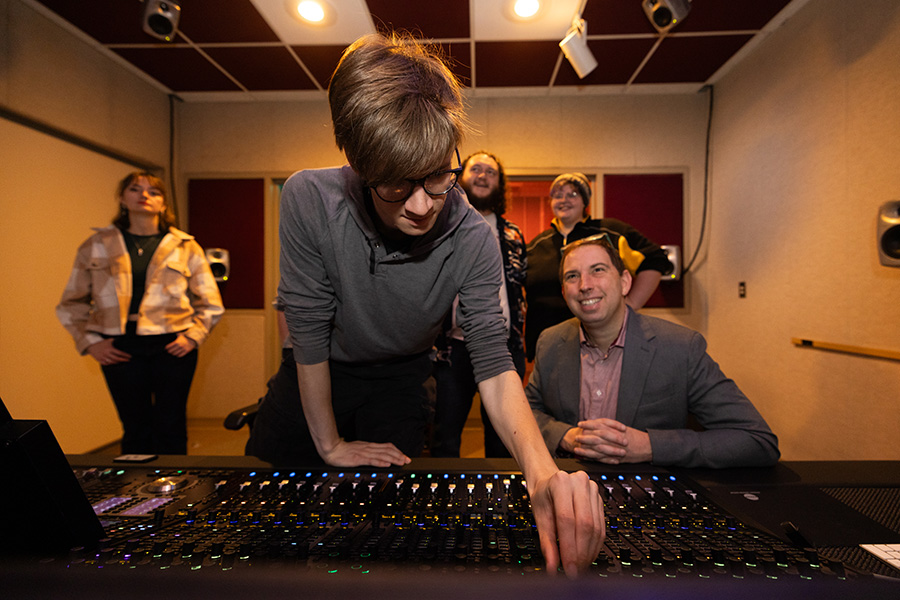
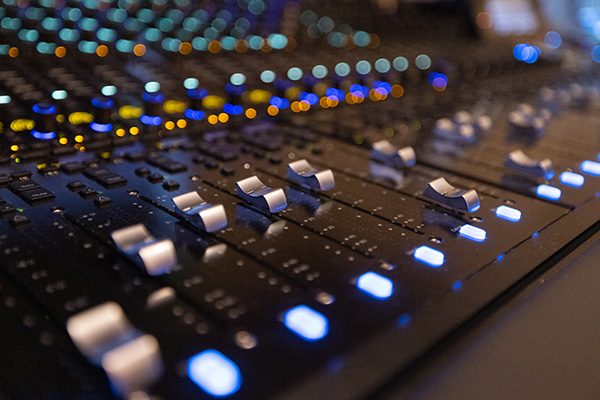
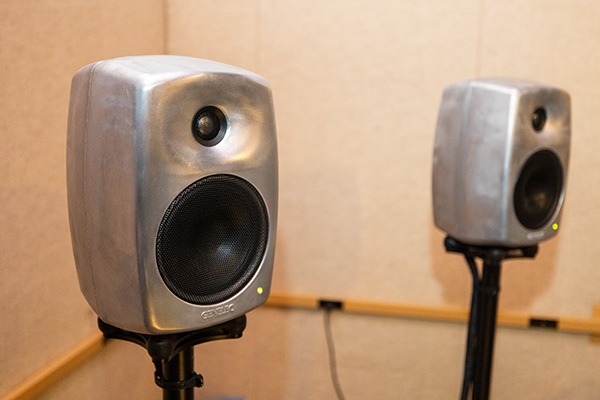
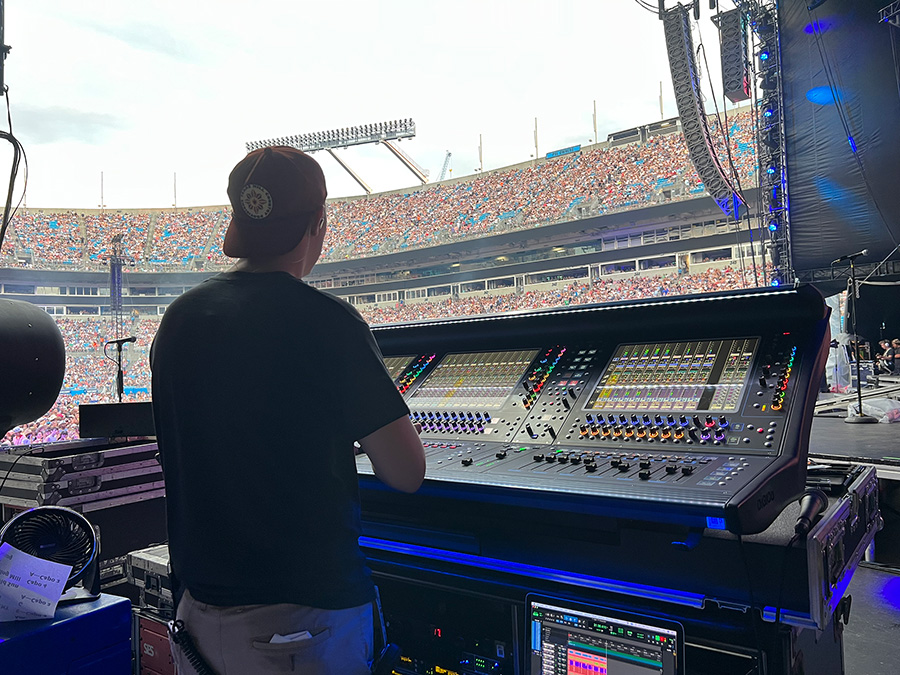
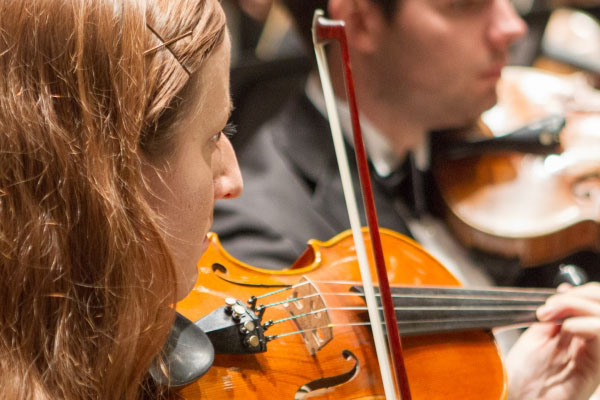
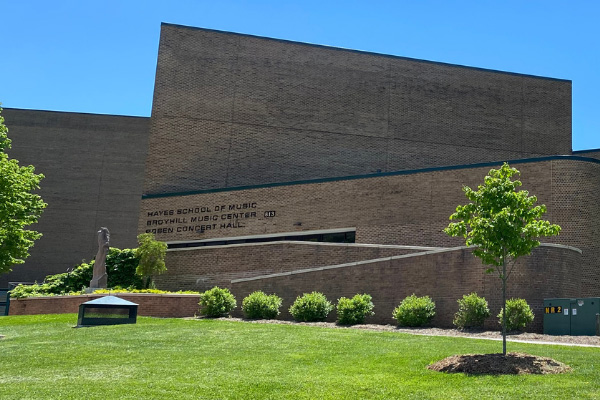
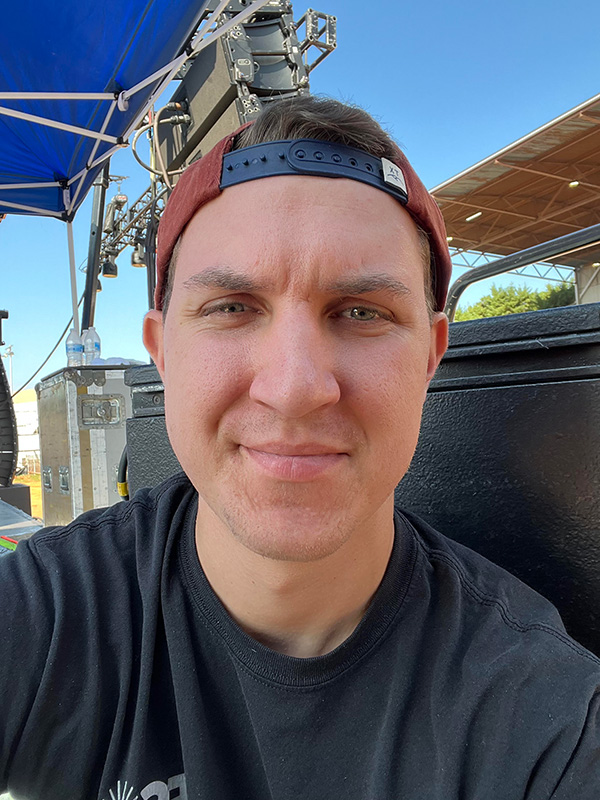



![How NCInnovation Is Rethinking Economic Development in North Carolina [faculty featured]](/_images/_posts/2026/02/rethinking-economic-development-600x400.jpg)







